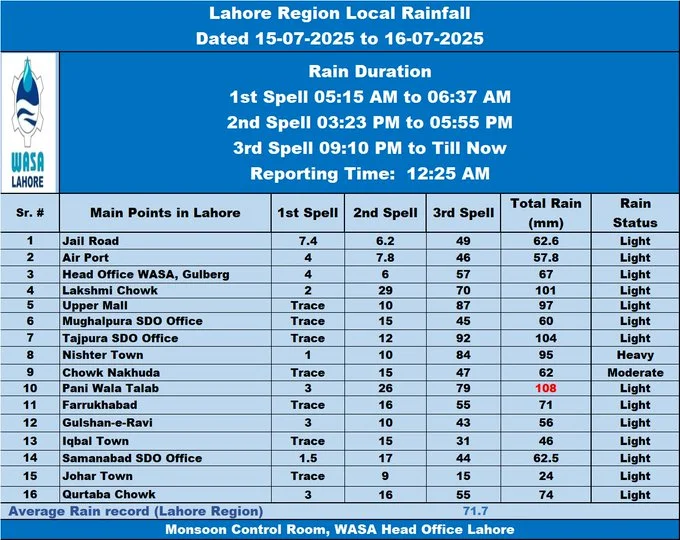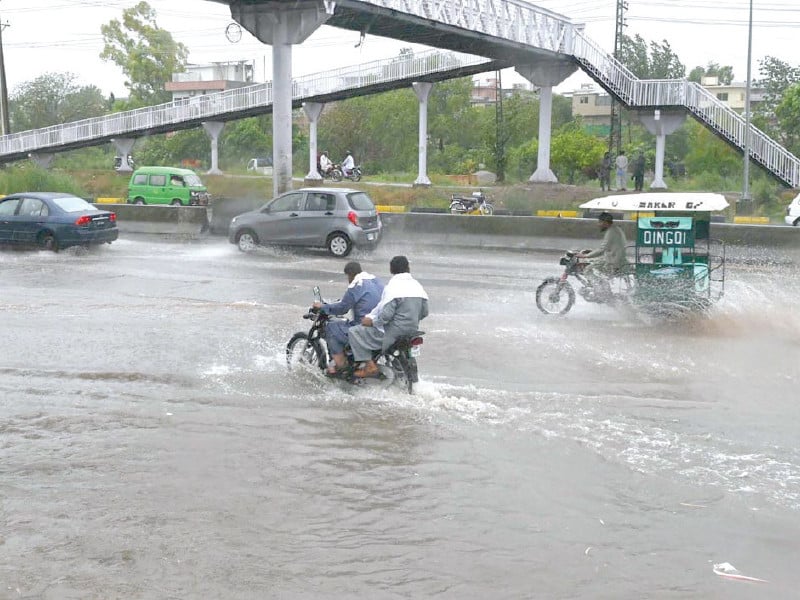LAHORE: A record-breaking spell of torrential rain submerged large parts of Lahore and several Punjab cities on Monday, triggering widespread power outages, transportation disruptions, and emergency alerts from authorities.
According to the Water and Sanitation Agency (WASA), Lahore’s
Paniwala Talab recorded a staggering
171mm of rain, the city’s highest reading in this monsoon spell, with Iqbal Town close behind at 169mm. The relentless downpour left major thoroughfares like Ferozepur Road, Canal Road, and Gulberg inundated, severely affecting mobility and daily routines.

Record Rainfall and Urban Flooding in Lahore
Heavy rain overwhelmed drainage systems across Lahore. Low-lying areas, especially around Gaddafi Stadium, experienced significant water accumulation, prompting field visits by Lahore Deputy Commissioner Syed Musa Raza and WASA officials.
“WASA staff and district administration teams are working around the clock to drain water from affected areas,” said the Deputy Commissioner while directing urgent efforts to clear waterlogged streets.
Meanwhile, rainwater seeped into homes in
Johar Town’s Board of Revenue Society, leaving residents grappling with property damage and power disruptions.
Experts attribute such intense rainfall to shifting monsoon patterns. According to climate researchers cited in a Pakistan Meteorological Department (PMD) report, Punjab has seen a
20–30% increase in extreme rainfall events over the past decade, raising concerns about urban flood preparedness.
Widespread Power Outages: LESCO, HESCO Grapple with Restoration
In Lahore, the
Lahore Electric Supply Company (LESCO) confirmed that multiple feeders were tripped due to waterlogging and safety shutdowns. Restoration efforts were delayed as persistent rain posed hazards to linemen and repair teams.
“Power restoration will commence as soon as the rain stops to ensure safety,” stated a LESCO spokesperson.
Beyond Lahore, severe weather impacted power infrastructure in several regions:
- Faisalabad faced prolonged blackouts following a torrential downpour.
- Arifwala experienced intermittent rain that disrupted electricity across multiple neighborhoods.
- In Hyderabad, strong winds and rain led to the collapse of high-tension poles, causing localised blackouts. The Hyderabad Electric Supply Company (HESCO) later restored supply to several key grid stations, including Khanoth and Bhanoth, as per official updates.
These outages highlight the vulnerabilities in Punjab’s aging power infrastructure, particularly under extreme weather conditions.
Rain Batters Multiple Punjab Cities
While Lahore bore the brunt of the downpour, other regions across Punjab also endured heavy rain:
- Pattoki, Okara, Sahiwal, Chichawatni, Mian Channu, Sargodha, Sialkot, and Gujrat reported intermittent showers.
- In Sheikhupura, rainwater entered homes on Ghang Road and in Shah Colony, causing distress among residents.
- Pakpattan witnessed a tragic incident where a woman died of electrocution during rainfall.
As per a PDMA bulletin, further showers are forecast until
July 17, raising the risk of additional flooding in susceptible urban zones.

Air Travel Disruptions in Lahore
The
Allama Iqbal International Airport in Lahore struggled to maintain flight schedules amid the turbulent weather. Air traffic control instructed at least three incoming flights to hold in the air due to poor visibility and storm conditions. Flights operated by Pakistan International Airlines (PIA) from Jeddah and Dubai were among those facing landing difficulties.
An aviation analyst from Karachi observed:
“Monsoon systems in Punjab are increasingly intense, requiring advanced weather forecasting tools for safer flight operations.”
Such disruptions underscore the operational challenges posed by volatile monsoon systems to Pakistan’s aviation sector.
PDMA Puts All Departments on High Alert
In response to the ongoing
monsoon rains, the
Provincial Disaster Management Authority (PDMA) issued a high-alert advisory across Punjab.
Director General Irfan Ali Kathia directed all deputy commissioners to remain vigilant and ensure swift action in emergencies. The provincial control room and district emergency operation centres have been fully activated, maintaining round-the-clock monitoring.
“All relevant departments must stay on high alert to effectively manage any crisis,” said Kathia.
The PDMA advised residents to:
- Stay away from electric poles and hanging wires
- Avoid wading into floodwaters, especially with children
- Report emergencies via the PDMA helpline (1129)
These advisories are critical to preventing further casualties, especially following incidents like the fatal electrocution reported in Pakpattan.
Drainage Efforts Under Strain
The sheer volume of rainfall has strained Lahore’s drainage systems. According to WASA engineers, the city’s stormwater drainage capacity can handle rainfall intensities up to
60-70mm per hour, but this spell exceeded those thresholds in several localities.
An urban planning expert from Punjab University noted:
“Without upgrading our drainage infrastructure and urban planning standards, Lahore will face frequent urban flooding episodes. Climate resilience must be integrated into city development plans.”
Such expert insights highlight the intersection of urban planning, climate change, and disaster risk management.
Long-term Climate Implications
Meteorologists from the
Pakistan Meteorological Department (PMD) have warned that monsoon variability will continue to intensify under climate change. Rising sea surface temperatures in the Arabian Sea and Bay of Bengal contribute to more vigorous monsoon currents, bringing heavier rainfall inland.
As per PMD’s seasonal forecast, Punjab should brace for
above-normal rainfall through July, raising concerns about crop damage, urban flooding, and public health risks linked to standing water.











